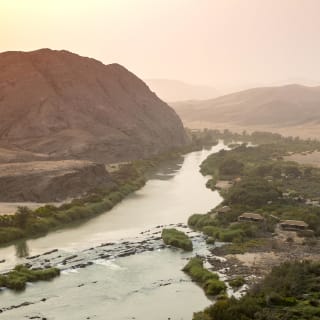
Vaccinations and Health Precautions for Namibia
Travel Safely and Well-Prepared
Travel Safely and Well-Prepared
A trip to Namibia promises breathtaking landscapes, incredible wildlife encounters, and unforgettable adventures in the African wilderness. However, before you embark on your journey, it’s essential to consider your health precautions. The hot and arid climate can be physically demanding, and outside of Windhoek, medical facilities are often limited. Additionally, certain regions of the country pose a higher risk of infectious diseases such as malaria or gastrointestinal illnesses.
In this guide, we’ll cover the recommended vaccinations for Namibia, effective ways to protect yourself against malaria and other health risks, and the essentials for a well-stocked travel medical kit. Plus, we’ll provide valuable tips on general health precautions to help you enjoy your trip worry-free.
Core Vaccinations for Travelers to Namibia
A solid foundation of vaccinations is essential for a safe and healthy trip to Namibia. In addition to protection against specific tropical diseases, travelers should ensure that their routine immunizations are up to date according to current medical recommendations. These vaccinations not only protect individuals but also contribute to public health by preventing the spread of potentially dangerous diseases.
Recommended Routine Vaccinations
The World Health Organization (WHO), the Centers for Disease Control and Prevention (CDC), and other international health authorities recommend that all travelers to Namibia have complete immunization coverage for the following diseases:
- Tetanus – A bacterial infection transmitted through minor skin wounds that can cause severe muscle spasms.
- Diphtheria – A highly contagious respiratory disease that can lead to serious complications.
- Polio (Poliomyelitis) – While Namibia is considered polio-free, vaccination remains crucial to prevent reintroduction of the virus.
- Whooping Cough (Pertussis) – This bacterial infection, particularly dangerous for infants, can also cause severe illness in adults.
- Measles, Mumps, and Rubella (MMR) – Since measles outbreaks still occur in parts of Africa, full immunization against these highly contagious viral infections is essential.
Additional Recommended Vaccinations for Namibia
In addition to these standard vaccines, the following immunizations are particularly recommended for travelers to Namibia:
- Hepatitis A – Strongly advised for all travelers, as the virus spreads through contaminated food and water.
- Hepatitis B – Recommended for those planning extended stays or having close contact with the local population, as the disease is transmitted through blood and bodily fluids.
- Typhoid – Ideal for travelers staying in remote areas or consuming food and water under less-than-hygienic conditions.
What If Routine Vaccinations Are Missing?
Travelers without these essential immunizations face a higher risk of infection both in Namibia and upon their return home. Tetanus, diphtheria, and polio vaccinations should be updated before departure, as should the Hepatitis A vaccine due to its high prevalence in Namibia.
Another significant health concern is malaria. While no vaccine exists, preventive medication is highly recommended for certain regions of Namibia. Additionally, travelers should take precautions against mosquito bites to minimize infection risks.
Since medical care outside of Windhoek is limited, it’s advisable to consult a travel health or tropical medicine specialist well in advance. This ensures that all necessary vaccinations are up to date and that individual health risks are assessed properly.
Regional Vaccination Recommendations for Namibia
Namibia’s diverse climate zones and landscapes also mean varying health risks depending on the region. While Windhoek, the coastal areas, and the Namib Desert are malaria-free, the northern regions of the country have a higher risk of infectious diseases. Travelers should tailor their vaccinations to their planned itinerary and consult a travel health specialist well in advance of their trip.
Vaccinations for Northern Regions – Etosha, Ohangwena & Kavango
Northern Namibia, particularly in the Zambezi (Caprivi Strip), Kavango West, Kavango East, and Ohangwena provinces, has a high malaria risk year-round, with peak transmission during the rainy season from November to April. Travelers heading to these regions should take the following precautions:
- Malaria prophylaxis – Consult a doctor to determine whether preventive medication or an emergency standby treatment is appropriate.
- Mosquito protection – Wear light-colored, long-sleeved clothing, use insect repellents containing DEET or Icaridin, and sleep under impregnated mosquito nets.
- Schistosomiasis (Bilharzia) prevention – Avoid swimming or wading in stagnant water, particularly in the Kavango region, as this parasitic infection is common in lakes and slow-moving rivers.
- Routine vaccinations – In addition to the standard vaccinations (tetanus, diphtheria, polio, measles, and pertussis), a Hepatitis A vaccine is highly recommended.
For travelers exploring remote areas, additional vaccinations may be advisable:
- Rabies – Recommended for those with potential exposure to wild or domestic animals in rural regions.
- Typhoid – Important for those staying in areas with questionable hygiene standards.
Vaccinations for Otjozondjupa & Omaheke Regions
The Otjozondjupa and Omaheke regions, located in central and eastern Namibia, have a lower malaria risk than the northern provinces. However, travelers should still take basic health precautions:
- Mosquito protection – Malaria cases are rare but possible during the rainy season (November to April). Use repellents, wear protective clothing, and sleep under nets when necessary.
- Emergency malaria medication – For extended stays or travel to more humid areas, carrying emergency malaria treatment is advisable.
- Hepatitis B – Recommended for long-term stays or close interaction with the local population.
- Meningococcal vaccination – May be advised for independent travelers or those in close contact with children.
Health Precautions for Windhoek and Southern Namibia
Although Windhoek and southern Namibia are considered malaria-free, travelers should still prioritize basic health precautions. A well-planned vaccination strategy significantly reduces health risks and ensures a safe and enjoyable trip to Namibia.
Malaria and Mosquito Protection in Namibia
One of the most significant health concerns when traveling to Namibia is the risk of malaria. While some parts of the country are malaria-free, the northern and northeastern regions pose a higher risk of infection. Additionally, transmission rates vary by season, making careful preparation essential.
Malaria Risk by Region
Malaria risk levels in Namibia differ depending on location. The highest-risk areas include the Zambezi (Caprivi Strip), Kavango West, and Kavango East, as well as parts of Ohangwena. Other northern regions, such as Kunene, Omusati, Oshana, and Oshikoto, also present some risk, particularly during the rainy season from November to April.
Additional high-risk areas include the northeastern parts of Otjozondjupa and Omaheke, including the cities of Grootfontein and Tsumeb. Even the popular Etosha National Park, a major safari destination, falls within a zone of seasonal malaria risk.
By contrast, Windhoek, the coastal regions, the Namib Desert, and areas south of Mariental are generally malaria-free. However, travelers should always stay informed about current conditions, as epidemiological risks may change.
Effective Malaria Prevention Strategies
For trips to high-risk malaria regions, preventive medication is strongly recommended. The choice of the right medication should be discussed with a travel health specialist or tropical medicine expert. In areas with low to moderate risk, carrying an emergency standby treatment may be a suitable alternative.
Beyond medication, mosquito bite prevention is crucial:
- Wear light-colored, long-sleeved clothing, especially in the evening and at night.
- Use insect repellents containing at least 20% DEET on exposed skin.
- Sleep under insecticide-treated mosquito nets in areas where malaria is a concern.
- Stay in accommodations with air conditioning or insect screens to minimize exposure.
Additional Mosquito Protection Tips
Alongside medication and basic prevention measures, additional strategies can further reduce the risk of mosquito bites:
- Treat clothing and gear with permethrin for long-lasting mosquito resistance.
- Seal windows, doors, and roof gaps to keep mosquitoes out of indoor spaces.
- Use fans or air conditioning, as mosquitoes tend to avoid moving air.
- Consider Indoor Residual Spraying (IRS), a method used to reduce mosquito populations inside buildings.
Recognizing Malaria Symptoms
It is essential to be aware of malaria symptoms, which can include:
- Fever
- Chills
- Headaches
- Muscle aches
Since malaria symptoms can appear weeks or even months after travel, any suspicious illness should be taken seriously. If symptoms occur, seek medical attention immediately.
With proper preparation and effective prevention measures, travelers can significantly reduce the risk of malaria and fully enjoy the beauty of Namibia without unnecessary health concerns.
Additional Vaccinations and Preventive Measures
While some vaccinations are considered standard for travel to Namibia, additional protective measures may be necessary depending on your itinerary, duration of stay, and personal health factors. These include vaccinations for yellow fever and rabies, as well as targeted prevention against infectious diseases.
Yellow Fever Vaccination: When Is It Necessary?
Namibia is not a yellow fever-endemic country, meaning vaccination is not required for travelers arriving from Europe or other non-affected regions. However, Namibian authorities do require a valid yellow fever vaccination certificate from travelers coming from or transiting through yellow fever-endemic areas for more than 12 hours.
For example, if you are traveling to Namibia via Kenya or Zambia, check the latest regulations well in advance.
Because the yellow fever vaccine is only available at authorized vaccination centers and must be administered at least 10 days before entry, early planning is essential. A single dose provides lifelong protection.
Rabies Vaccination and Recommended Precautions
Rabies is a serious health risk in Namibia, primarily due to stray dogs, wild animals, and bats. Travelers spending extended time in remote areas, those with frequent animal contact, or those engaging in outdoor activities such as camping and hiking should consider a preventive rabies vaccination.
Since medical care outside of Windhoek is limited, access to post-exposure prophylaxis (PEP) may not always be guaranteed. A pre-exposure rabies vaccination is particularly recommended for:
- Independent travelers exploring remote regions
- Families traveling with children (who are more likely to approach animals)
- Travelers with an increased risk of exposure, such as veterinarians or wildlife researchers
The rabies vaccine consists of three doses administered over 28 days and provides reliable protection.
Regardless of vaccination status, any animal bite or scratch should be taken seriously and medically assessed immediately. If bitten, it is crucial to:
- Wash the wound thoroughly with soap and water for at least 15 minutes.
- Seek medical attention as soon as possible to determine the need for further treatment.
Proper planning and preventive measures can significantly reduce health risks, ensuring a safe and worry-free journey through Namibia.
Travel First Aid Kit for Namibia – Be Prepared for Any Situation
A well-stocked travel first aid kit is essential for a trip to Namibia. The hot climate, limited medical facilities outside major cities, and risk of infections make careful preparation crucial. Being well-equipped allows travelers to manage minor health issues independently and prevent more serious illnesses.
Essential Medications and Emergency Supplies
To ensure optimal health and safety in Namibia, your first aid kit should include the following essential medications:
- Pain relievers and fever reducers such as paracetamol or ibuprofen for headaches or feverish infections.
- Anti-diarrheal medication like loperamide and oral rehydration salts to prevent dehydration.
- Motion sickness and nausea remedies for long drives or unfamiliar food.
- Antihistamines to treat allergies and insect bites.
- Broad-spectrum antibiotics (prescribed by a doctor) for bacterial infections.
- Malaria prophylaxis or emergency malaria medication, if traveling to high-risk areas.
In addition, your first aid kit should contain basic emergency supplies:
- Bandages, sterile gauze pads, and medical tape for wound care.
- Disinfectant solution for cleaning cuts and scrapes.
- A digital thermometer, tweezers, and small scissors for general first aid needs.
- Water purification tablets or a portable filter for remote areas where clean drinking water may be unavailable.
Since medical services outside Windhoek can be limited, purchasing international travel health insurance with an emergency evacuation option is highly recommended.
Preventive Measures Against Sun Exposure and Traveler’s Diarrhea
Namibia’s extreme climate poses unique challenges for travelers. To avoid heatstroke and dehydration, take the following precautions:
- Apply sunscreen with high SPF regularly.
- Wear a hat and sunglasses to protect against intense UV radiation.
- Stay hydrated, even if you don’t feel thirsty.
- Avoid strenuous activity during midday heat and wear light, breathable clothing.
Traveler’s diarrhea is another common issue in Namibia. To reduce the risk of gastrointestinal illness:
- Drink only bottled or boiled water – avoid ice cubes.
- Choose clean, well-cooked food, especially from street vendors.
- Maintain strict hand hygiene – carry hand sanitizer for convenience.
- Pack anti-diarrheal medication and electrolyte solutions to treat symptoms quickly.
With these preparations, travelers can explore Namibia with confidence, knowing they are well-equipped to handle any health-related challenges along the way.
Healthcare Services and Emergency Assistance in Windhoek
Windhoek offers the best medical facilities in Namibia, with both public and private healthcare services available. While private clinics provide high-quality medical care, public hospitals are often overcrowded and come with long wait times.
Availability and Quality of Medical Facilities
Namibia’s capital is home to several hospitals and clinics offering a wide range of medical treatments. Public hospitals, such as Windhoek Central Hospital and Katutura State Hospital, are accessible to all patients, but quality of care can vary due to long waiting times and limited resources.
For faster and higher-quality treatment, private hospitals are the better option. Some of Windhoek’s top private clinics include:
- Rhino Park Private Hospital
- Mediclinic Windhoek
- Roman Catholic Hospital
These facilities are equipped with modern medical technology and specialist doctors, but treatment costs can be high. It is strongly recommended to have international health insurance that covers private medical care and emergency medical evacuation if needed.
Emergency Services and Important Contacts
In a medical emergency, it is crucial to contact the right emergency services quickly. Windhoek has both government and private emergency services that operate 24/7.
Here are the most important emergency numbers:
- General emergency number: 10111 or 112
- Ambulance services: 061 211 111
- E-Med Rescue 24: 924 or 061 411 600
- Crisis Response (medical and security emergencies): 081 881 8181 or 061 303 395
- Police emergency: 10111
- Fire department central line: 061 211 111
Travelers should save these numbers before departure and keep them readily accessible at all times.
In severe medical cases, it may be necessary to arrange medical evacuation to South Africa for specialized treatment.
By planning ahead and ensuring proper insurance coverage, travelers can enjoy their Namibia adventure worry-free, knowing they are well-prepared for any medical emergencies.
Experience the magic of Africa with experts who have explored every corner themselves
Your dream holiday, tailor-made by experts.
Our travel consultants not only admire Africa from afar, but explore the most impressive regions every year to experience the cultures, landscapes and safari experiences first-hand.
From the initial inspiration to the moment you return home full of stories, we will accompany you personally - be it by phone, email or WhatsApp, whenever you need us. Explore the wilderness of Africa, be enchanted by its breathtaking beauty and create unforgettable memories. Together we will create your unique safari adventure!
Experts for your Africa trip







